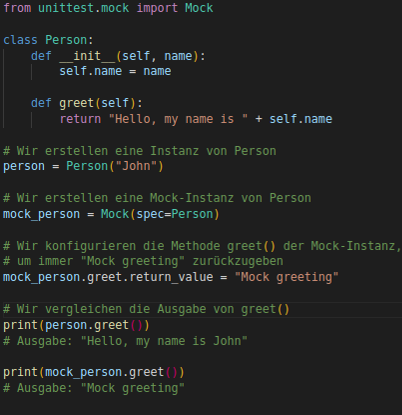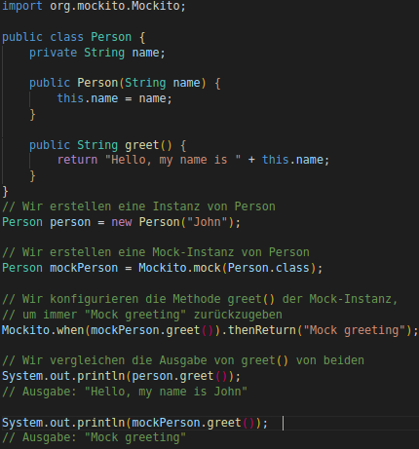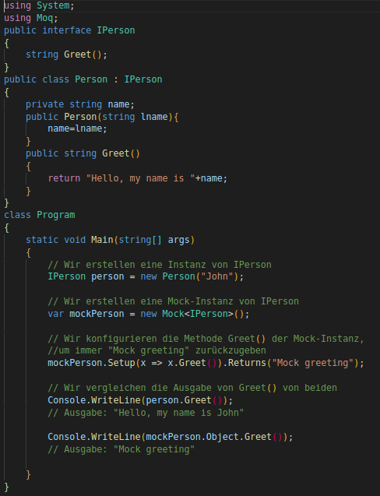Mocking Frameworks
Summary
This document gives basic insights about Mocking and Mocking Frameworks with their usages, advantages and disadvantages. Also, some code examples showing mock testing demo using Frameworks like Mock(Python), Mockito(Java) and Moq(.NET) are also given.
Requirements
- Visual Studio Code
- Packages: unittest.mock (Python), org.mockito.Mockito(Java) and Moq(.NET)
Description
Mocking
Mocking is a process used in unit testing when unit being tested has external dependencies.It creates mock objects (also known as replacement or dummy objects) that can be used in the simulation of real objects.The main purpose of this process is isolation of code being tested rather than concentrating on the behaviour or state of external dependencies.Mocking is normally required when components under test has dependencies which has no been implemented yet or if implementation is in progress (eg:REST APIs) or when components update system state(DB calls).
Mocking makes use of three types of replacement objects: fakes, stubs and mocks. The fakes are used when you want to test the behavior of a class that has no dependencies. The stubs are used to test the behavior of a class that has dependencies.They will return results based on specific set of inputs and won't respond to something outside of what is programmed for the test. The mocks are advanced version of stubs which can also additionally modify behaviors like how many times method should be called, with what data and in which order.
Mocking Frameworks
Mocking Frameworks are software libraries used to generate replacement objects like Stubs and Mocks i.e dummy implementation does not have to be written in addition to real implementation,and they also compliments Unit Testing Frameworks by isolating dependencies. But remember they are not replacement for unit testing frameworks and they should not be used to test the actual behavior of the software. Rather they are used to simulate or mock dependencies, especially to simulate external APIs and Databases in tests.
Advantages
- Tests can be isolated and thereby improving the test quality. It helps developers to write focused and concise unit tests.
- It can also help to run tests faster and generate test data.
Disadvantages
- Can lead to complex and difficult-to-understand tests if not used carefully.
- Can also lead to writing tests that do not adequately reflect the actual behavior of the software.
Frameworks in different programming languages
- Mockito (Java)
- Moq (.NET)
- Mock (Python)
- EasyMock (Java)
- jMock (Java)
- Sinon.js(JS)
- pymox (Python)
- rr (Ruby)
Examples
Mock Demo in Python
import unittest
from unittest.mock import Mock, patch
import requests
import json
def get_users():
# API-Aufruf einer Beispiel API, der Benutzerdaten abruft
response = requests.get(f"https://gorest.co.in/public/v2/users")
if response.status_code == 200:
return response.json()
return None
def DoesGowdaExist(users:list[dict]):
# Testet ob ein Benutzer namens "Gowda" existiert
for user in users:
if "Gowda" in user["name"]:
return True
return False
class TestAPI(unittest.TestCase):
@patch("requests.get")
def test_get_user_data(self, mock_get):
# Unittest bei dem statt der Beipiel-API ein Mock verwendet wird
mock_result = [{"id": 1, "name": "Gowda",
'email': 'test@user.com',
'gender': 'male', 'status': 'active'}]
# Erstelle einen Mock für die response-Variable
mock_response = Mock()
mock_response.status_code = 200
mock_response.json.return_value = mock_result
# Setze den Rückgabewert des Mock-Objekts für den get-Aufruf
mock_get.return_value = mock_response
# Rufe die get_user_data-Funktion auf
users = get_users()
print(f"users: {json.dumps(users, indent=4)}")
# Stelle sicher, dass der Rückgabewert des Mock-Objekts zurückgegeben wurde
self.assertEqual(users, mock_result)
self.assertTrue(DoesGowdaExist(users),"Gowda does not exist")
print("Gowda does exist")
def main(mock:bool):
# Wenn mock=False ist, wird die API aufgerufen
# Wenn mock=False ist wird der Unitest ausgeführt der den Aufruf der API mit einem Mock-Objekt überschreibt
if mock:
unittest.main()
else:
users= get_users()
print(f"users: {json.dumps(users, indent=4)} \n\n")
print(f"Gowda does {'' if DoesGowdaExist(users) else 'not '}exist")
if __name__ == '__main__':
main(mock=True)


